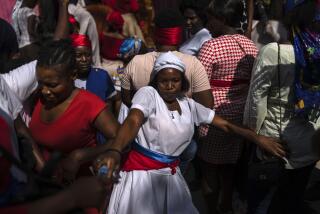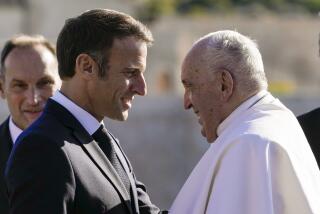Slaying of Monks in Algeria Casts Light on Call for Forgiveness
- Share via
After seven kidnapped French Roman Catholic monks were reported slain by rebels in Algeria last spring, their superiors in the Trappist order headed to the strife-torn nation to arrange their burial. A grisly discovery awaited them: The killers had returned only the severed heads of their victims.
But despite the brutality of that scene, a document has come to light that adds a new dimension to the monks’ deaths: a final testament written by the abbot of the Atlas Monastery, Dom Christian de Cherge, with a message that provides a paradigm for a new kind of martyrdom in the 20th century, and a new ideal of interfaith harmony.
Knowing that the militants attempting to establish an Islamic government were targeting foreigners, De Cherge had written the testament more than two years ago to affirm his admiration for the Algerian people and his belief that Muslims and Christians could live in harmony.
“I don’t see . . . how I could rejoice if the people I love were indiscriminately accused of my murder,” he wrote. “It would be too high a price to pay for what will be called, perhaps, ‘the grace of martyrdom,’ to owe this to an Algerian . . . especially if he says he is acting in fidelity to what he believes to be Islam.”
*
De Cherge even extended friendship to his future killer, writing, “My last-minute friend, who will not know what you are doing . . . may we find each other, happy ‘good thieves’ in Paradise, if it please God, the father of us both.”
De Cherge’s testament, which has been widely circulated in Algeria and Europe, offers hope for reconciliation in the strife-torn African nation, said the Rev. Armand Veilleux, procurator general of the Trappist order.
“Through their death, the dialogue between Christianity and Islam has entered a completely new phase,” Veilleux said.
Such a reconciliation will not come easily. The conflict flared again Aug. 1 when French Bishop Pierre Claverie, who was stationed in an Algerian diocese, was killed with his driver as they were returning from a ceremony honoring the slain monks.
*
Claverie had vowed to remain in his Algerian diocese after the monks’ slayings, despite the hostility of groups seeking to establish a strict Islamic state. “To leave would be to give credence to those who want to separate communities,” Claverie had said.
The deaths of the monks and the bishop also put a new twist on the “grace of martyrdom.”
While early Christians were slain for refusing to renounce their faith, and later missionaries for preaching Christianity in hostile territory, the monks were noted for their strong ties to their Muslim neighbors and were viewed as dying for a relatively new ideal: harmony between different faiths.
“These monks are true martyrs of inter-religious dialogue,” the Rev. James Conner, a Trappist abbot of Assumption Abbey in Ava., Mo., wrote in an editorial in the Bulletin of Monastic Interreligious Dialogue.
Their deaths “serve as a poignant reminder to all of us that inter-religious dialogue can be a very serious affair” and that the effort requires “perhaps even the commitment of one’s life,” Conner wrote.
The slayings have received only passing news coverage in the United States. But the incident shocked those involved in ecumenical activities in America, where such efforts seldom exact so extreme a price.
The American Muslim Council in a statement said the monks’ “silent and humble way of life gave testimony to their peaceful relations” with their Algerian neighbors. “Islamic teachings prohibit attacks against innocent civilians and extend protection to sincere people of God--whether they be Muslims or non-Muslims,” the group said.
Many Algerian residents were shocked and saddened by the monks’ slayings. Up to 60,000 people are estimated to have been killed in Algeria’s four-year civil conflict, the vast majority Algerian.
Militants have killed everyone from moderate Islamic leaders to people drinking alcohol and women wearing bikinis. French nationals have been targeted because of France’s tacit support for the government and because of the traditional role French missionaries have played in Algeria. The slain monks were not missionaries but were following the Trappist tradition of extensive prayer and contemplation while leading a generally cloistered life.
The monastery, established during French colonial rule, had close ties with the local community of Tibhirine, and even provided a building for the local mosque.
De Cherge, the leader of the monastic community, had been raised partly in colonial Algeria, where his mother taught him respect for the local religion and culture. He later served in the French army in its unsuccessful attempt to quell the Algerian rebellion.
During the war, a Muslim friend in De Cherge’s army unit once shielded him from enemy bullets, and “that remained with him,” Veilleux said. De Cherge later became a priest, serving an affluent Parisian congregation, before becoming a monk. He studied Arabic and the Koran in Rome and then went to Atlas.
Veilleux said the monks were respected by most militant groups, and De Cherge dissuaded an earlier band of rebels from attacking them. Still, they kept suitcases packed to flee, and a monk’s journal discovered at the monastery after they were kidnapped by the Armed Islamic Group indicated that the men had spiritually prepared themselves for violent death.
And in De Cherge’s testament, he noted the likelihood that the brothers would not survive the religious and political conflict: “If it should happen one day . . . that I become a victim of the terrorism which now seems ready to encompass all the foreigners in Algeria, I would like my community, my church, my family, to remember that my life was given to God and to this country.”
More to Read
Sign up for Essential California
The most important California stories and recommendations in your inbox every morning.
You may occasionally receive promotional content from the Los Angeles Times.













